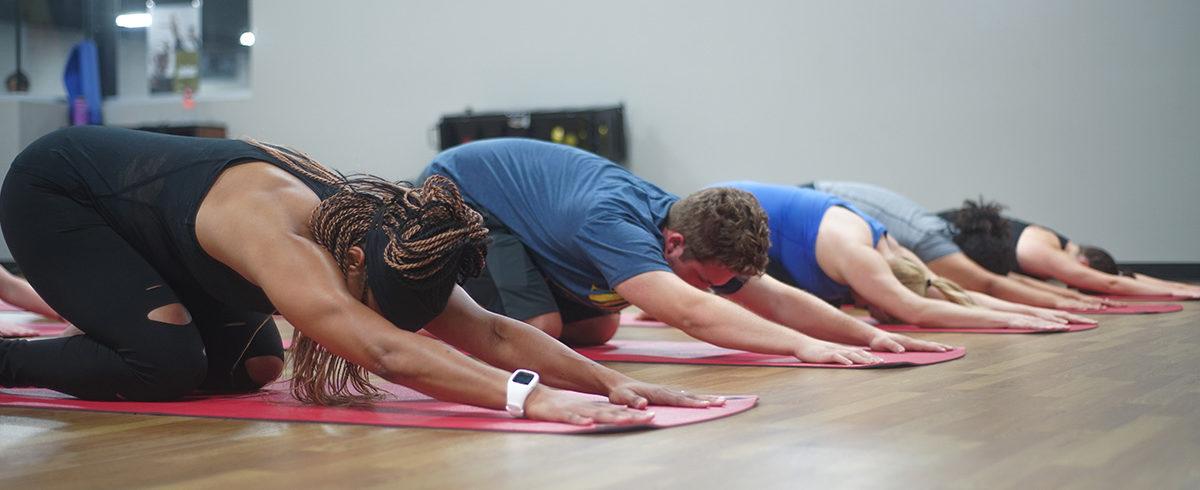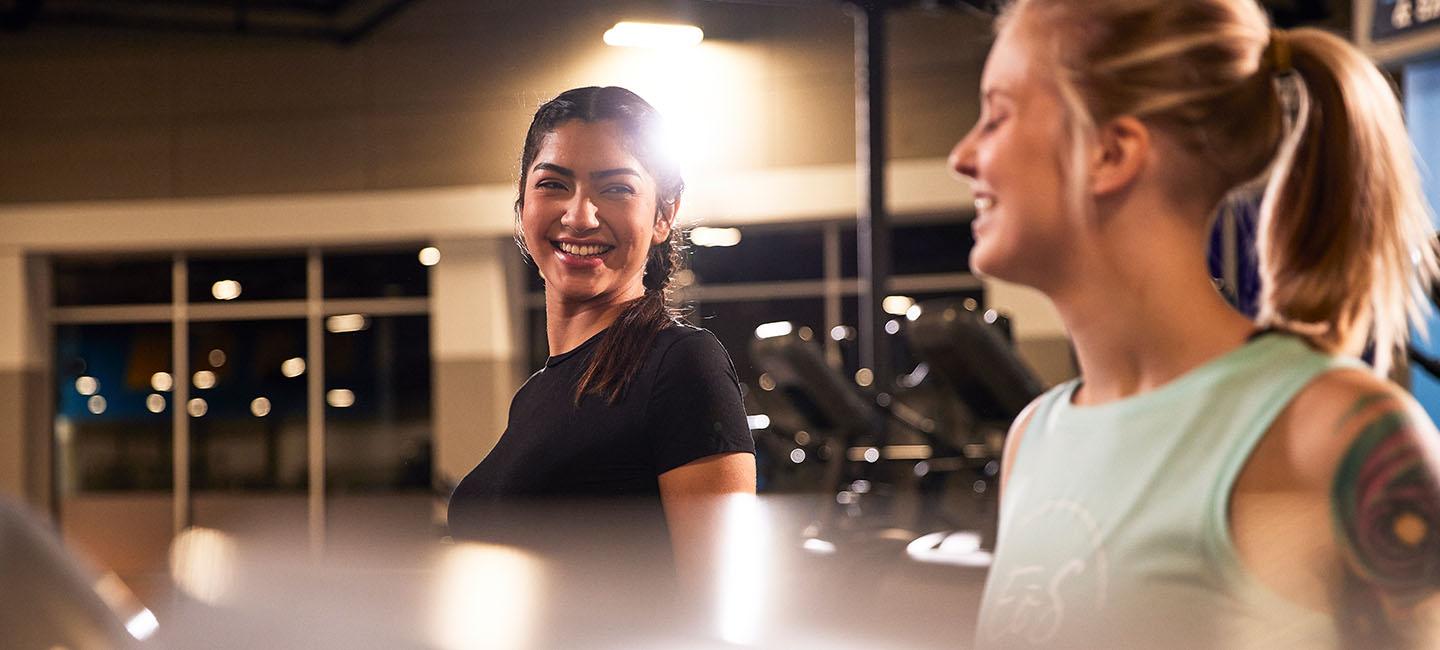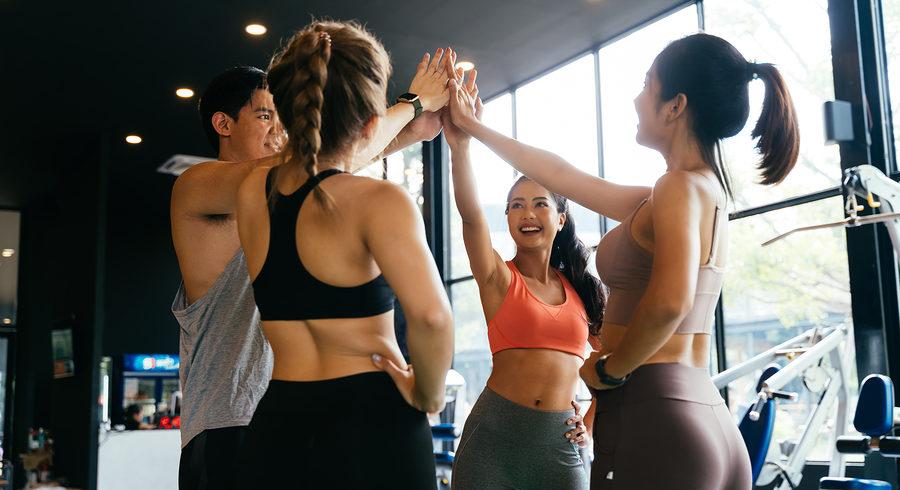How Exercise Can Help Improve Your Posture
Fitness Tips
Lifestyle
Oct 12, 2022 • 8min read
If the word posture brings back memories of your elementary school teacher’s voice telling you not to slouch and to “sit up straight,” know that they really were looking out for your health. The average American adult now spends about 6½ hours a day sitting — that’s up an hour a day since 2007, and teenagers sit an average of eight hours per day. With numbers like these, it’s no wonder our natural posture has become increasingly curved, slumped, and sore.
But with most health conditions, prevention is always the best medicine. You can improve your posture and spinal health by making a few lifestyle adjustments and practicing the right posture exercises.
Why Are Posture Exercises Important?
You may not immediately recognize your posture’s strain— but your body does, and bad posture can affect your physical and mental health. When you’re slouching and curving your shoulders forward when standing, muscles in your back lengthen while muscles on the front of the body like your chest and abdominals actually shorten. The body changes according to the posture you spend the most time in, and, over time, shortened muscles can cause more health problems. Other results of bad posture include back pain, spinal dysfunction, joint degeneration, and rounded shoulders.
But bad posture does much more than affect you physically; it impacts how we produce hormones to how your blood is circulating – which in turn affects your ability to move as you age.
For example, the body associates closed or slumped-over posture with stress, which can affect your metabolism and the immune response. Too much stress may increase anxiety, weight and other suboptimal effects in the body.
Good posture is about more than standing up straight so you can look your best; it’s an integral part of your long-term health and can be achieved with basic posture exercises and stretches. Making sure you hold your body the right way, whether moving or still, can prevent pain, injuries, and other health problems.
What Is Good Posture?
Whether you’re working out, sitting, laying, standing, or walking, good posture involves training your body to place the least strain on muscles and ligaments.
The secret is in your spine. Your spine has three natural curves: at your neck, upper-back, and low back. Correct posture should maintain these curves, not increase them. Your head should be in line with your shoulders, and the top of your shoulder should be in line with your hips. Before you learn correct posture and start posture exercises, know the two types. It’s important to be mindful and maintain both:
Dynamic posture is how you hold your body on the move, like when you are walking, running, or bending over to pick up something.
Static posture, or standing posture is how you hold yourself when sitting, standing, or sleeping.
Maintaining good dynamic and static posture helps to:
- Keep bone and joints in the correct alignment so that muscles are being used properly
- Cut down the wear and tear of joints, like your knees, which also helps prevent arthritis
- Decrease the strain on the ligaments in the spine
- Prevent the spine from becoming fixed in abnormal positions
- Prevent fatigue when muscles are being used more efficiently
- Prevent backache and muscular pain
7 Posture Exercises & Stretches
Learning how to improve posture includes performing posture exercises that focus on stretching, using ergonomic chairs, and paying attention to how your body feels.
Stretching helps make you aware of your muscle placement. Maintaining flexible, long muscles is essential to good posture, and tight muscles can hinder your posture. For example, overly tight, shortened hip muscles tug your upper body forward and disrupt your posture. Rooted in yoga, these 7 posture exercises will help you improve posture, loosen up tight muscles, and sit and stand a little taller.
Child’s Pose

Child’s Pose can lengthen your spine, glutes, and hamstrings and help release lower back and neck tension. Relax in this pose for up to 5 minutes while continuing to breathe deeply:
- Kneel on the floor with your toes together and your knees hip-width apart.
- Sink your hips back down toward your feet.
- Then, place your forehead on the floor.
- Keep your arms extended as far in front of you as possible, with palms on the floor.
- Breathe deeply into the back of your rib cage and waist.
Thoracic Rotation

Resting exercises to improve posture like this spinal twist can relieve the tightness and pain in your back while increasing stability and mobility. Repeat this movement five to 10 times on both sides.
- Lie on your side with the top leg towards your chest at 90-degree angle.
- Extend one arm out and the other on your knee, turning your chest toward the ceiling.
- Exhale as you rotate your top arm up toward the ceiling and extend it all the way to the opposite side of the floor.
- Take a long inhale, exhale in this position, and bring your arm back to starting position.
Forward Fold

Release tension in your spine, hamstrings, and glutes while holding standing posture exercises like the Forward Fold for about one minute. It also stretches your hips and legs, and you should feel the entire back side of your body opening up and lengthening.
- Stand with your big toes touching and your heels slightly apart.
- Bring your hands to your hips and fold forward at your hips.
- Release your hands toward the floor or place them on a block. Don’t worry if your hands don’t touch the ground — just go as far as you can.
- Bend your knees slightly, soften your hips joints, and allow your spine to lengthen.
- Tuck your chin into your chest.
Cat Cow

Arching your spine up and down while resting on all fours is known as Cat and Cow stretches. They help improve posture, relieve tension in your torso, shoulders, and neck, and also helps increase blood flow. Repeat for one minute.
- Rest on your hands and knees with your weight balanced evenly on all fours.
- Inhale to look up, dropping your belly button toward the ground as you extend your spine for cow pose.
- Exhale while arching your spine toward the ceiling and tuck your chin into your chest for cat pose.
Chest Opener

A standing stretch is especially good if you sit all day, which can make your chest move inward. Repeat at least ten times.
- Stand with your feet about hip-width apart.
- Bring your arms behind you and interlace your fingers, pressing your palms together.
- Keep your head, neck, and spine in one line as you look straight ahead.
- Inhale as you lift your chest toward the ceiling and bring your hands toward the floor.
- Breathe deeply and hold for five breaths.
- Release and relax for a few breaths.
High Plank

Exercises to improve posture like this yoga pose help to relieve pain and stiffness throughout your body while strengthening your shoulders, glutes, and hamstrings. It also helps strengthen your core and back, which is good for posture. Hold for one minute.
- Come onto your hands and feet, straighten your legs to lift your knees off the floor, and raise your hips.
- Straighten your back and engage your abdominal, arm, and leg muscles.
- Lengthen the back of your neck, and look down at the floor.
- Make sure to keep your chest open and your shoulders back.
Side Plank

This pose focuses on the neutral alignment of your spine and legs. It strengthens your side and glutes to support your back and improve posture. Repeat both sides and hold for 30 seconds each.
- From a high plank position, bring your left hand slightly into the center.
- Drop down to your forearm, shift your weight onto your left side, stack your ankles, and lift your hips, opening your chest away from the floor.
- Place your right hand on your hip or extend it toward the ceiling.
- You can drop your left knee to the floor for extra support.
- Engage your abdominals, side body, and glutes as you maintain this pose.
- Align your body straight from the crown of your head to your heels.
- Look straight ahead.
Ready to learn more exercises to help improve your dynamic and static posture? At EōS, you’ll find dozens of yoga classes and stretching classes for all levels. Get started by signing up for a Complimentary 7-Day Pass at EōS today.




